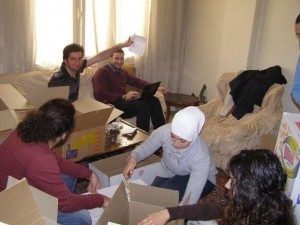Homs Relief Campaign Obstructed by Security Forces

The campaign was inspired by a simple question a girl asked during a meeting of Syrian activists in Damascus, “What about the families that left their homes in Homs and don’t have any financial or emotional support?”
The meeting brought together young political activists and former detainees, as well as members of opposition parties such as the Movement to Build the Syrian State, MBST, representatives of Kurdish parties and the National Coordination Committee, NCC. Their debate resulted in the idea to start a campaign entitled Homs in Our Hearts.
“We wanted to deliver two messages at the same time,” said one of the participants in the campaign. “The first was addressed to the regime, which has put Homs under strict surveillance, and it says that we are able to defy the use of weapons against civilians. As for the second message, it was intended for the distressed people of Homs,” he added. “We wanted to let them know that they are still in our hearts and that we come to them carrying love.”
Organising a relief campaign in the current political atmosphere does not come without risks.
“When we decided to go to Homs, not only did we take into consideration the possibility of being arrested, but we also knew that we could be killed,” said one of the activists involved in the campaign. But despite these dangers, preparations started to advertise the campaign through Facebook and the news media. Activists publicised dedicated telephone numbers for receiving donations, in addition to seeking the help of a number of celebrities, such as director Laith Hajjo and actor Nidal Seijary, who followed the campaign till the last minute.
One of the activists said he was intrigued that the campaign was not subject to any harassment on the part of security forces. Organisers were openly bringing in food supplies and donations to the office of MBST and were also giving their real names when talking to news media.
“I honestly don’t have a clear answer as to why the campaign was not subject to harassment, but I think [security officers] didn’t expect young Syrians to be willing to go Homs despite all the adverse conditions; they thought this campaign would [collapse],” he said.
Organisers confirmed that the campaign did not receive any permission from security officials, and that they did not intend to seek such permission in the first place, because it would have made them lose credibility among the Syrian public.
“We wanted to defy the [bad] security situation and go to Homs with food supplies, despite the great risks that we faced,” said one of the organisers.
Activists contacted youth groups and opposition committees in Homs, in addition to asking the Red Crescent to have its representatives meet them at the entrance to the city and help them get into neighborhoods under siege to hand out food rations.
The campaign organisers were supposed to set off on March 13, 2012, but the massacre perpetrated by regime forces and thugs, shabiha, in the district of Karm az-Zaytoun prevented their departure. It was agreed at the last minute to postpone the campaign, which led to differences inside the organising committee. The majority believed that a delay would benefit the campaign because it would increase the amount of food and other humanitarian aid supplies offered by the public. This was indeed what happened, according to Javan, one of the organising members.
“After the campaign was postponed, [people] offered a lot of aid supplies, and the number of those willing to go with us to Homs also increased,” said Javan. “We also intensified our contacts with the media in order to protect the campaign from any crackdown on the part of the regime.”
Another member of the committee, Rima, had differing views.
“We wanted to go to Homs because it is under siege and unarmed citizens there are being killed,” she said. “We don’t want to go there during times of peace.”
The members of the organising committee agreed on a new departure. On March 19, 2012, more than 100 people convoy participants gathered at seven o’clock in the morning on Adawi highway, Damascus, where there were also three lorries carrying food supplies, blankets and mattresses collected through public donations.
While participants were hanging banners on the cars, a security patrol appeared and stopped the convoy. An officer told the organisers to apply to the Damascus police headquarters to get permission. A delegation from the organising committee then went to meet a number of security and administrative officials, but the talks – that lasted for 12 hours – did not result in the necessary permission. The activists had to hand the cargo over to the Syrian Red Crescent, which would then cooperate with the committee of Homs in Our Hearts to deliver the aid.
Despite the measures that prevented the convoy from heading to Homs, all those behind the campaign felt that their mission was accomplished and that the messages intended for both the authorities and the people of Homs were delivered.
“The success of this attempt, on all levels, made the participants agree to carry on with their civic activities, and in the near future, they will organise a number of relief activities,” said one of the members.
This group is considering organising a campaign to hand out humanitarian relief supplies to families that have escaped to Damascus from Homs, Idlib and other Syrian cities that have been attacked. Distributing these supplies from the capital is easier than going to other areas
